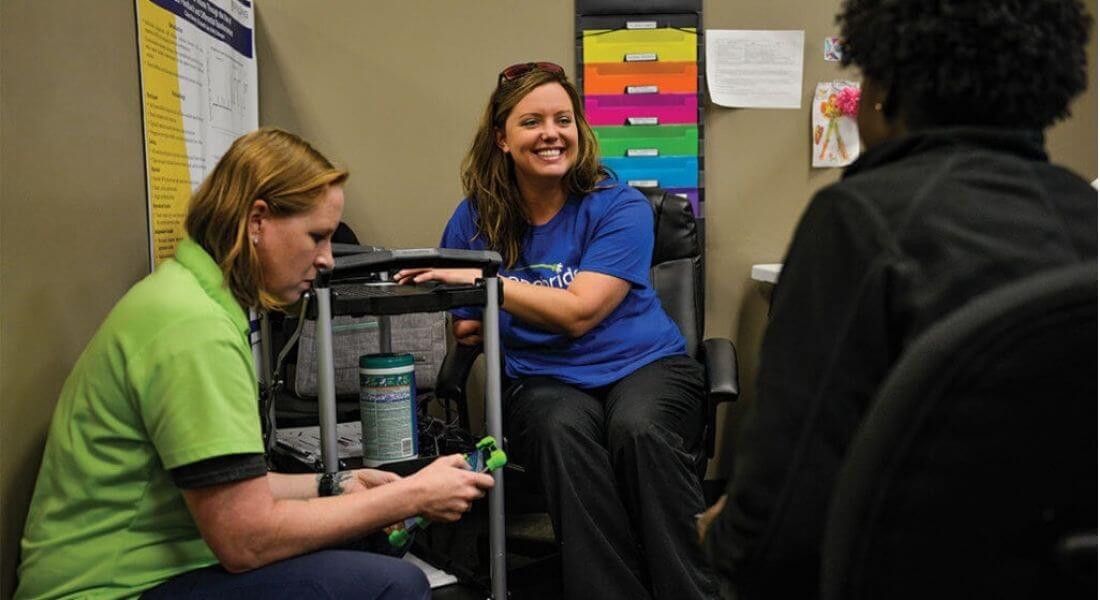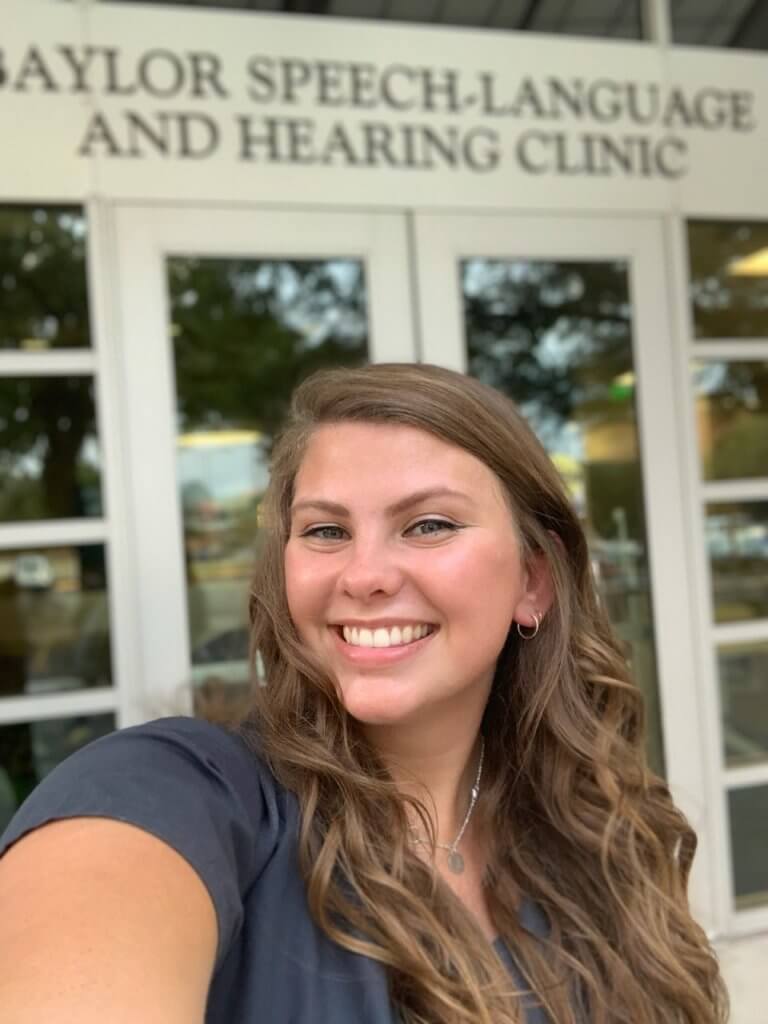What it’s Like to Gain Fieldwork Experience in an Interdisciplinary Pediatric Clinic
January 10, 2022
January 10, 2022

Choosing to work in caring fields for children is life-changing for everyone involved. Sometimes the choice to work in pediatric therapy is made long before entering a university, and sometimes it seems to fall into your lap.
No matter how they get there, our Hopebridge clinicians consider themselves lucky to have the opportunity to work in this community, and we wish to extend those opportunities even further.
As part of our vision to continue to help others learn and grow – which includes our kids and our team members – we are dedicated to supporting undergraduate and graduate level students on an array of paths. We offer the Hopebridge Fieldwork Experience for students looking to elevate their careers in speech and occupational therapy, in addition to applied behavior analysis (ABA).
We’re always looking for passionate, talented individuals to stand alongside SLPs, OTs, Psychologists and more to continue learning for kids with autism.
When students are placed in one of our pediatric clinics through our university partnerships around the country, we provide a unique learning environment so they can build upon their skill sets to use throughout their careers. Our goals are to supply best-in-class supervision and create an effective pathway for students to excel in school and beyond, all while reigniting their enthusiasm for their fields.
Why choose Hopebridge for your internship or externship in speech therapy or occupational therapy? For students seeking a pediatric clinical rotation, our programs are unmatched.
In addition to getting the rundown on our university partnerships from Hopebridge Outpatient Fieldwork and Professional Development Advisor Abby Hamilton, MS, OTR/L, we spoke to former speech therapy and occupational therapy students for their perspectives. We asked them to share the benefits of working at Hopebridge to gain their clinical hours. Here are the main reasons they appreciated spending part of their schooling in our centers:
1. Insight into the world of autism and other developmental disorders
Many schools, hospitals and clinics offer pediatric outpatient experience, but the Hopebridge environment provides a deeper look into the autism community. With a program that is centered around early intensive behavioral interventions (EIBI), our students have the chance to work closely with the behavior side of treatment, in addition to using their skill sets to treat children with a range of other diagnoses. This includes supporting the progress of some patients who are in the center for up to 40 hours per week. Hopebridge students are able to learn more about autism spectrum disorder (ASD) and ABA therapy to determine if this is a population they’d like to better serve in the future.
“It’s so rare to get this condensed of an introduction to autism. In most other pediatric settings, you’ll have some exposure to children with autism, but this was a huge crash course on so many elements of the spectrum I wouldn’t have found anywhere else. Our students gain the skills here, and even if they don’t stay with us long-term – which we hope they do! – they can pull from the skill sets they acquired here, wherever they end up,” said Leah Rischar, COTA, who worked for Hopebridge after her student fieldwork experience.

2. Interdisciplinary, collaborative model
When students are placed in one of our centers, they have the added benefit of learning about a range of disciplines, in addition to their own fields of choice. Our 360 Care model combines various pediatric services, giving our students a taste of what it’s like to closely collaborate with clinicians on topics that go beyond their typical studies, plus use their own knowledge in fresh, new ways to meet goals for their patients. Occupational therapy and speech therapy students and professionals don’t naturally collaborate as closely in other settings, which helps Hopebridge stand apart from other placements.
“If you have a choice of where to serve your internship, look somewhere you can find a community. I chose to work at Hopebridge mainly because of my conversation with my supervisor about the team before I started. You can learn almost anywhere, but if you don’t feel valued while you’re there, it’s probably not where you want to end up, even if it’s good on paper,” said Mikaela Hall, a speech-language pathologist (SLP) and former student with Hopebridge.
3. Multiple layers of supervision
Mentorship goes beyond one person at Hopebridge. Students not only have their supervisor, but they also have an interdisciplinary team of support within the centers, plus the opportunity to virtually connect with Abby as the program leader.
“I really appreciated how my supervisor and the other therapists helped me the first couple weeks. It was so easy to come into their team and interact with them. They always asked what I needed and I never felt uncomfortable asking questions. It wasn’t just my supervisor looking out for me; I had support from the entire therapy team,” said Mikaela.

4. Ability to develop a range of skills
Fieldwork hours at Hopebridge are not limited to one type of treatment or patient. Every day is different in our centers and children have challenges and abilities across a spectrum, so speech and occupational therapy students will be able to try their hand at many aspects of treatment. Those participating in our program will build upon their skill sets through experience with evaluations, documentation, telehealth sessions, clinical reasoning and by applying what they learn in school to real-life scenarios.
“Within our industries of occupational therapy and speech therapy, there are so many settings in which we could work. Sometimes students know where they want to be and their choice of fieldwork is purposeful. Other times, students want their clinical experience to be diverse to give them a robust idea of where their skill can best be used in the future. It’s a great chance to figure out what you want to do for your career, and I’m glad I was placed with Hopebridge along the way,” said Leah.
5. Program flexibility and personalization
Hopebridge offers a range of opportunities for fellowships, clinical rotations, observation hours, dissertations and thesis work. From part-time options and shorter rotations, to full-time externships up to 40 hours per week, we can give as much hands-on experience as the education program requires. Plus, each student can work with their supervisor to determine the appropriate caseload that best matches their education requirements and professional goals.
6. Intimate clinic setting with a large network of opportunities
Students tell us the community is one of the biggest benefits of doing their clinical rotations at Hopebridge. The center atmosphere allows students to create relationships with other therapists and children in the center, but the size of Hopebridge as a whole broadens that effect. Hopebridge’s large national network creates a magnitude of placement options for students around the country, as well as opportunities to advance their careers after graduation. Many of our students find their passion while serving in our centers and ultimately choose to continue to grow with us, too. We love to see our students get excited about their experience at Hopebridge, and we’re equally as excited to have them stay with us long-term!
“At Hopebridge, our students get so much more support than from solely your supervisor. As a larger, multisite provider, our students have access to so many learning opportunities alongside our team, including participating in seminars, virtual conferences and a student summit. Beyond clinical skills, students are also able to build their confidence as they learn and practice professional soft skills, as well,” said Abby.
Are you interested in pediatric therapy? If you are interested in getting a fresh take on occupational therapy or speech therapy in a fast-paced, challenging, creative and sensory-rich environment during your externship, Hopebridge might be a good fit for you.
To join the Hopebridge team while you’re in school, reach out to us through our Fieldwork Contact Form and talk to your school about our program. If we don’t already partner with your school for fieldwork opportunities, we can connect with them to develop a plan to get you in the door.
Or, are you wrapping up your rotations to graduate and ready to take your boards? Whether a COTA, Registered Occupational Therapist (OTR), clinical fellow, SLP, check out the open positions throughout the United States to take the next step in your career.
*Informed consent was obtained from the participants in this article. This information should not be captured and reused without express permission from Hopebridge, LLC.
Team Spotlight
October 06, 2020
Denver Team Spotlight: Hopebridge Kicks off Colorado Opening with Superstar ABA Therapy Team
Team Spotlight
February 02, 2018
RBT Taylor Talamantes Tells Why Working at Hopebridge is Such a Treat
Team Spotlight
May 30, 2023
Hopebridge Regional BCBA Sam Sardone Finds her “Family” and Clinical Joy by Supporting Other Behavior Analysts
Team Spotlight
July 25, 2022
Moving for the Cause: Hopebridge BCBA Answers the Call to Serve